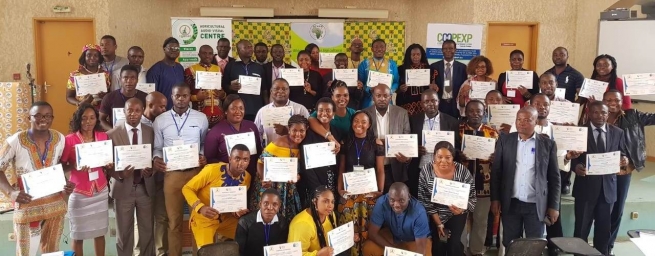In the framework of building capacity of its members, the Cameroon Forum for Agricultural Advisory Services (CAMFAAS) in collaboration with the African Forum for Agricultural Advisory Services (AFAAS), the Global Forum for Rural Advisory Services (GFRAS) and Cooperative des Experts en Appui Conseil (COOPEXP) and with support from the government of Cameroon, CAMFAAS organised a training of trainers (ToT) workshop on Postharvest management and the New Extensionist Learning Kit (NELK) developed by GFRAS, in Yaoundé, Cameroon.
Facing the challenges and gaps that encounter extension professionals in Cameroon related to emerging issues and demand from farmers, CAMFAAS gathered more than thirty participants from across the country representing the academia, researchers, NGOs, public and private sectors at the Catholic University of Central Africa, Ekounou campus from 27th to 31st August 2018. The main objectives of the workshop were to strengthen capacity of members on functional new skills on the New Extensionist Learning Kit (NELK) and to share and disseminate information on the existence of technologies and good practices with the aim of building capacity to integrate the promotion of PHM within their work.
This workshop was the first of its kind organised in Central Africa and specifically in Cameroon. It aimed at fostering Cameroonian professionals to match with GFRAS standards and answer to international exigencies on Agricultural Advisory and extension services matters. As Hlami Ngwenya the GFRAS consultant and trainer states, “we talk about agriculture as an innovation system where farmers have to deal with climate change, link to market, gender issues; and all these need functional skills”. The NELK aims to equip extensionists with these skills on top of technical skills. In the same light, Jerry Egessa the Coordinator of the PHM project at AFAAS explains that ‘’Fighting against postharvest losses includes the use of new means of storing seeds with new improved bags and metallic silos’’.
At the end of the five days’ training, the participants were bestowed with skills on six modules (Extension Approaches and Tools, Agricultural Entrepreneurship and Extension Value Chains among others), which are out of the sixteen modules that constitute the NELK. Participants expressed the need to complete the remaining modules in the near future. The CAMFAAS Chair, Dr Louis-Marie Kakdeu complimented that the ToT clearly represents the path towards professionalization of agricultural advisory and extension services in Cameroon’.

